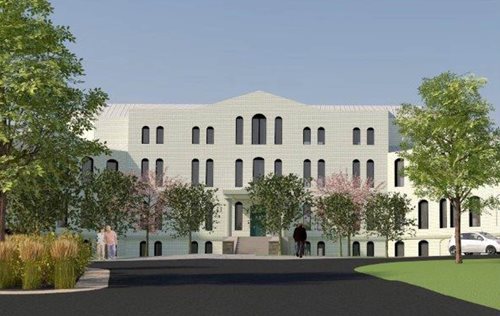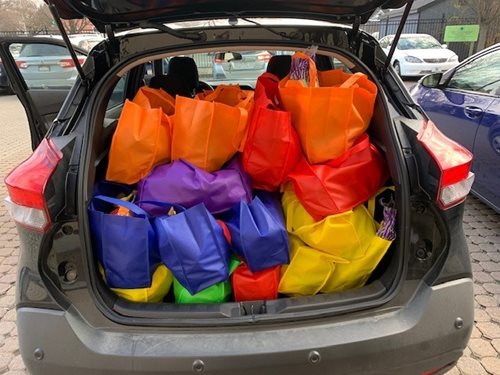Warren Dawson has lived in one of RUPCO Inc.'s apartment communities in Kingston, New York, for three years. Before that, he was homeless for some time in South Carolina, he says. He stayed in shelters and in parks. He eventually went north to New York for a funeral and decided to stay to be closer to family. That's when he entered a shelter program for veterans, qualifying through his service in the National Guard and the U.S. Army. From there, he qualified for a grant through Kingston-based RUPCO, Inc., and he's had a home in one of the organization's apartment communities ever since.
Earlier this year, Dawson's nephew, who was living with him, tested positive for COVID-19. The two began to quarantine. Dawson, who did not get tested, had mild symptoms, too. They couldn't leave the apartment for three weeks.
 Dawson is on a fixed income that was already spread thin. He'd been searching for a job, but that halted, due to the pandemic. Meanwhile, he was trying to pay back family members who had helped him get established. His expenses mounted. He fell behind on rent.
Dawson is on a fixed income that was already spread thin. He'd been searching for a job, but that halted, due to the pandemic. Meanwhile, he was trying to pay back family members who had helped him get established. His expenses mounted. He fell behind on rent.
"I called RUPCO and told them about the situation. They told me there was a grant I could apply for and I was able to catch up. That allowed me to get back on my feet," he says. "It took the stress off."
The rental relief came through NeighborWorks America's Rental Resilience Fund, which has dispersed more than $10.2 million to network organizations like RUPCO. The fund was made possible with a generous contribution from the Wells Fargo Foundation, which made a commitment to keep people safe and housed during the pandemic.
Dawson says these last months have been hard, "but I guess it's been hard for everyone." Since RUPCO helped with his back rent, he's managed, though. He's making consistent payments, working on his other bills, and trying to improve his credit score.
"I'm hoping other veterans who need help know there are agencies out there and grants out there," he says. "They don't have to be in a situation like I was in to get help."
He's grateful for the help from RUPCO, NeighborWorks and Wells Fargo, he says. "I would like to thank all the different agencies that were able to help me during difficult times."
 Kelsey Vargas, director of program services for RUPCO, says her organization has aided 40 families using the NeighborWorks Rental Relief grant. "The funding that we received definitely helped keep a lot of our tenants housed, which was our main goal," she says.
Kelsey Vargas, director of program services for RUPCO, says her organization has aided 40 families using the NeighborWorks Rental Relief grant. "The funding that we received definitely helped keep a lot of our tenants housed, which was our main goal," she says.
Kingston, New York, where RUPCO is based, had an additional complication during COVID-19. Aong with dealing with the pandemic itself, they found that available, affordable apartments, already a scarcity, became even more scarce as residents of New York City fled crowded conditions to the suburbs. Kingston has a population of around 22,000. "But a lot of people were coming to Kingston, to Ulster County, to get away from life in the city. For us, that's made things a little more difficult. We've had tenants look at an apartment in the morning, and then hear in the afternoon that someone from the city was able to pay cash, a year in advance."
That means keeping residents in the apartments they already have is even more important, Vargas says. "Having this money to be able to keep folks stably housed has been super helpful."
Vargas says that while the older population her organization serves has received social security checks, which pay the rent, the younger population, especially those who worked in the restaurant industry, have had a tough time during COVID-19. She says the Rental Resilience money has helped that population, along with artists. Both visual and performing artists lost their venues to perform and gallery space to show and sell their work. "We're happy to have this funding to tell them: ‘We do have a way to support you.'"
 The young adults in Kingston felt the impact of COVID-19 immediately. Layoffs hit that age group hard. There were also changes to their own schooling or schooling for their young children when everything went virtual. "We've seen an effect on mental health," Vargas says. "This level of isolation and abrupt change is something a lot of tenants have never experienced before." Those who can recount something similar, she says, are the veterans in the community, who describe feelings of isolation when they went overseas.
The young adults in Kingston felt the impact of COVID-19 immediately. Layoffs hit that age group hard. There were also changes to their own schooling or schooling for their young children when everything went virtual. "We've seen an effect on mental health," Vargas says. "This level of isolation and abrupt change is something a lot of tenants have never experienced before." Those who can recount something similar, she says, are the veterans in the community, who describe feelings of isolation when they went overseas.
Along with providing funding, RUPCO has provided budget counseling to residents in tight situations, and personal protective equipment and groceries when possible, especially for older residents. As with other NeighborWorks network organizations, RUPCO reports new partnerships this year. In all network organizations, the goal is the same: to keep the community stable and safe.
04/27/2021

